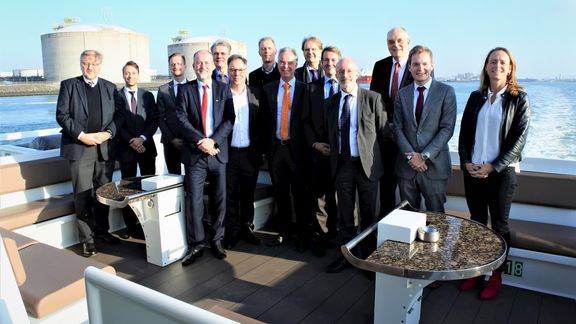German business community positive about energy transition in Port of Rotterdam
The German business community has praised the projects that will make the Port of Rotterdam CO₂ neutral in three steps. This happened on Wednesday 20 November 2019 during a visit by a delegation from Bundesverband der Deutschen Industrie (BDI) to the Port of Rotterdam.

The delegation comprised 15 participants, including representatives from ThyssenKrupp, BASF, ExxonMobil and Scott AG. The reception in Rotterdam formed part of a two-day visit to the Netherlands that was organised in cooperation with VNO-NCW.
“The Port of Rotterdam handles the challenge of climate protection in a consistent and pragmatic manner. The decarbonization of this logistical global hub, that is central to German industry, is exemplary.”, said BDI delegation leader Holger Lösch.
Stijn van Els, delegation leader on behalf of the Port of Rotterdam Authority added: “We should be proud that the leading role that Rotterdam is taking in the energy transition is being recognised by our partners in Germany. This can only work to strengthen the long-standing and extremely important links between Rotterdam and the German hinterland.”
Good accessibility shared interests
The German employers and the Port of Rotterdam Authority both emphasised promptness in realising a robust and sustainable international freight transport system. They highlighted their shared interests in increasing infrastructure capacity on rail freight and inland shipping.
Port of Rotterdam’s importance for Germany
A quarter of the freight throughput in the Port of Rotterdam is destined for Germany. Europe’s biggest economy imports ores, coal, oil and minerals as well as parts for industry via Europe’s biggest port. The Rhine, Neckar and Main rivers form a sustainable and efficient connection between important economic centres in Germany and the Port of Rotterdam.
Rotterdam is also part of an extensive network of direct rail connections for freight transport. Deep-sea shipping companies choose the Port of Rotterdam as the first port of call in Northwest Europe. This offers time gains for shippers, as containers are already en route to the end customer via train, inland shipping or truck before the container vessel departs for its next European destination.